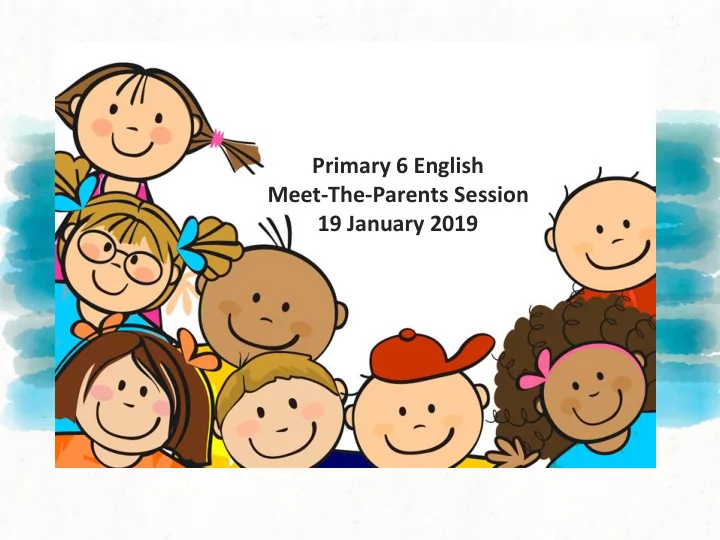

Primary 6 English Meet-The-Parents Session 19 January 2019
Curriculum and Learning Materials STELLAR Readers and STELLAR PACK Customised Learning Packages PSLE Booklet Listening Comprehension and Oral Booster Other schools’ Practice Papers Supplementary Lessons (Every Thursday, starting in Term 2) Reading Culture • myON • Library period
Jurong West Primary School BC Number student
Components ▹ Listening & Viewing ▹ Speaking & Representing ▹ Reading & Viewing ▹ Writing & Representing ▹ Language Use
Assessment Term 1 Term 2 Term 3 Term 4 Non-weighted Class-based Assessment (50 Marks) Mid – Year Preliminary PSLE Grammar MCQ Examination Examination (100 marks) Vocabulary MCQ (100 marks) (100 marks) Editing for Spelling Sentence Combining Comprehension (variety of questions) 0% 40% 60%
Make-up Policy Only MC is accepted or under the unfortunate circumstances of a demise of a family member. Other reasons or letters will not be accepted*. (Not accepted = zero marks) Make-up is only for Paper 1 and Oral .
SA1, SA2 and PSLE Format
Paper Component Item Type Marks Weightage Duration 1 Situational OE 55 27.5% 1 hr 10 min Writing & Continuous Writing (Paper 1) 2 Language Use & OE / MCQ 95 47.5% 1 hr 50 min Comprehension (Paper 2) 3 Listening MCQ 20 10% About 35 Comprehension min (separate paper) (Paper 3) 4 Oral OE 30 15% 5 min Communication preparation (Paper 4) time Total 200 100%
Examination Format Oral (30 marks) ⊡ Reading Aloud – 10 marks ⊡ Stimulus-Based Conversation – 20 marks Paper 1 (55 marks) ⊡ Situational Writing – 15 marks ⊡ Composition - 40 marks - Content : 20 marks - Language and organisation: 20 marks
Paper 1 Continuous Writing No Requirements 1 Relevance to topic - Is the writing relevant to the topic given? 2 Relevance made to at least 1 picture - At least 1 picture must be used. 3 Connection between the pictures - Applicable only if 2 or all 3 pictures are used in the writing - The linkages between the pictures must be coherent. 4 Use of questions - Students are encouraged to use the questions listed in the question
Paper 2: Language Use and Comprehension Booklet A
Paper 2: Language Use and Comprehension Booklet B SYNTHESIS
Paper 3: Listening Comprehension 20 Multiple Choice Questions (20 marks) Variety of Texts
Paper 4: Oral (30 marks) Reading Aloud (10 marks) • Read with confidence (Sit with right posture, with hands holding the passage) • Read loudly and clearly. • Read fluently with appropriate pauses and without necessary hesitations. • Pronounce all words clearly and consistently throughout, good stresses on consonants. • Read with expression, especially at the dialogues. • Read with good and appropriate variation of pitch and tone.
Paper 4: Oral Stimulus-based Conversation (20 marks) • Maintain appropriate posture. • Interact very well with good eye contact. • Answer questions in a complete sentences. • Present experiences, feelings and thoughts with confidence. • Elaborate ideas with personal experiences which are well-developed and engaging. • Support opinions and ideas with reasons. • Use a wide range of appropriate vocabulary and structures, supported by correct pronunciation.
Strategies to help the child 1. Exposure to Standard Forms of English • Promote the use of standard English: Read quality books, newspapers and magazines Watch and listen to programmes that use Standard English e.g. Channel News Asia Visit the library regularly Use the dictionary
Strategies to help the child 2 . Focus On Areas of Weakness Ensure that your child does his homework and corrections regularly and accurately Ensure that your child learns his/her spelling and dictation Ensure that your child does his/her daily revision Identify areas of weakness through daily class work and practice papers Focused practice is more effective than completing whole practice papers.
Strategies to help the child 3. Participation In Language Activities Being actively engaged in activities organized in school e.g writing competitions, creative writing. Participating in class discussions and presentations provide good opportunities for language use.
Strategies to help the child 4 . Read Widely Increases knowledge and expands vocabulary Include stories, information texts, news reports and poems. These make students more aware of different text types and language features.
Strategies to help the child 5. Seek clarifications and ask questions in class Allow one to clear doubts and deepen his/her understanding
Thank You!
Recommend
More recommend